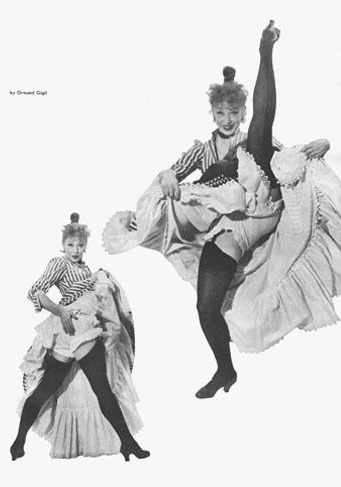Remembering Can-Can
Cole Porter wrote many infectious scores for the Broadway stage, with Anything Goes and Kiss Me, Kate as standouts of how wit and melody can be melded into glorious ditty after glorious ditty. Another hit musical of Porter’s myriad Broadway outings was Can-Can. Though it is seldom revived today, Can-Can nevertheless features an enchanting score, with songs such as “I Love Paris, “ “C’est Magnifique” and “I Am In Love” getting play outside the context of the show. Abe Burrows, known for his knack for writing sparkling comedy for the Broadway stage, wrote the book for Can-Can.
Set in 1893 in the Monmartre district of Paris, Can-Can tells the story of the lascivious dance hall Bal du Paris, owned and operated by one La Mome Pistache (Lilo). A conservative local judge, Aristide Forestier (Peter Cookson), is appalled by the establishment, particularly for its entertainment that includes the scandalous Can-Can dance which features scantily-clad (for the time) women showing off their legs and wagging their behinds. Forestier puts his influence behind trying to shut-down the Bal du Paris. His efforts are thwarted when he sends the local police to investigate. The officers enjoy Bal du Paris and its dancers, so they are of little help. Forestier decides to go himself, but he soon falls under the charms of La Mome Pistache. Despite his affections for the proprietress, he has La Mome and her girls arrested and sent to jail. This leaves Forestier conflicted. He loves La Mome, but he has a moral obligation to his community, not to mention his personal beliefs to uphold. He encourages her to escape, but when he kisses her, he is photographed by a reporter which leads to his own public scandal. He is disbarred, but with the aid of La Mome and her girls, they all go to court and are all found not guilty.
The musical also featured a subplot about one of the dancers, Claudine (Gwen Verdon), who is pursued by an art critic named Hilaire. She’s not really interested, but she does use the situation as a means to promote the art of a sculptor named Boris, a man with whom she is having a dalliance. Many people credit Can-Can for Gwen Vernon’s rise to stardom. It certainly was a juicy supporting role for a dancer of her abilities, and Verdon ended up eclipsing the show’s star Lilo who played La Mome Pistache with her dancing in Michael Kidd’s “Garden of Eden Ballet.”
Can-Can opened on Broadway on May 7, 1953 where it ran for 892 performances at the Shubert Theatre. Abe Burrows also directed and Michael Kidd choreographed. The musical won two Tony Awards, Best Featured Actress in a Musical (Verdon) and Best Choreography (Kidd). A 1981 revival of Can-Can played the Minskoff Theatre, but lasted only five performances. Critics generally found the piece dated and the story mediocre. Can-Can was never Broadway’s greatest musical, but it does have its charms and the Porter score makes it worth a revisit. A revisal of the piece was rumored for Broadway a few seasons back, but that production seems to have stalled. Could a Broadway revisal happen? I mean, it certainly “Can-Can” but I’m not sure that it “Will-Will.”










